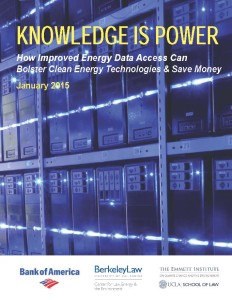 California is poised for a major energy transformation in the coming decades, with Governor Brown pledging to put the state on a path to 50% renewables and 50% less petroleum usage by 2030. Achieving this transformation will require a robust and thriving clean technology sector, including renewable energy and energy storage developers, energy efficiency contractors, smart grid hardware and software purveyors, and electric vehicle automakers, among others.
California is poised for a major energy transformation in the coming decades, with Governor Brown pledging to put the state on a path to 50% renewables and 50% less petroleum usage by 2030. Achieving this transformation will require a robust and thriving clean technology sector, including renewable energy and energy storage developers, energy efficiency contractors, smart grid hardware and software purveyors, and electric vehicle automakers, among others.
But to ensure the success of these industries, as well as a cost-effective energy transition for consumers, California must expand access to energy information. This information ranges from customer access to their long-term usage patterns in an easily-readable, standardized format, to utility statistics on distribution grid needs and pricing, to anonymized, aggregated energy usage patterns on a neighborhood scale. Customers can harness this information to use energy more efficiently, while clean technology companies can use it to improve their services, customer acquisition efforts, and competitiveness with traditional energy providers. Policy makers and nonprofit advocates could also use this information to target energy incentives to the customer groups and regions that would make the best use of them — thereby deploying limited public funds more cost-effectively.
To offer solutions for improved access to energy information, UC Berkeley and UCLA Schools of Law are today releasing the report Knowledge is Power: How Improved Energy Data Access Can Bolster Clean Energy Technologies & Save Money. The report resulted from a one-day gathering of clean technology leaders (including renewable energy developers, battery experts, smart grid suppliers, energy efficiency contractors, and electric vehicle automakers) and public officials. It is the fourteenth in the law schools’ Climate Change and Business Research Initiative, sponsored by Bank of America, which develops policies that help businesses prosper in an era of climate change.
The group identified barriers to expanded information access, from a lack of incentives and funding for utilities to collect and share data to concerns about compromising customer privacy and cybersecurity breaches. The report identifies information that would be most valuable to the clean technology sector and recommends that policy makers:
- Establish customers’ right to improved access to their own usage information through an easily organized, standardized format, including the disclosure of historic building energy audits;
- Develop cost-recovery mechanisms for utilities to collect and share aggregated, anonymized energy and market statistics to researchers and the private sector; and
- Fund the development and maintenance of secure energy information centers.
Most of these and other recommendations in the report will require action from state legislators and regulators, including via existing regulatory efforts at both the California Public Utilities Commission and California Energy Commission. Ultimately, by implementing steps like these, California can ensure a smoother and more cost-effective transition to a clean, efficient, and localized energy and transportation system.
Leave a Reply
You must be logged in to post a comment.


